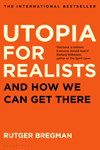Going against the political tide
Book review: Utopia For Realists, And How We Can Get There This provocative book proposes abolishing border controls and introducing a universal basic income.

Get the latest financial news, insights and expert analysis from our award-winning MoneyWeek team, to help you understand what really matters when it comes to your finances.
You are now subscribed
Your newsletter sign-up was successful
Want to add more newsletters?

Twice daily
MoneyWeek
Get the latest financial news, insights and expert analysis from our award-winning MoneyWeek team, to help you understand what really matters when it comes to your finances.

Four times a week
Look After My Bills
Sign up to our free money-saving newsletter, filled with the latest news and expert advice to help you find the best tips and deals for managing your bills. Start saving today!

Most Western governments see reducing immigration and cutting public spending as priorities. So Dutch historian Rutger Bregman is going against the political tide with his two main proposals: a universal basic income that would be given to people whether they were in work or not, and an abolition of border controls.
Bregman argues that a basic income would cut bureaucracy, reduce poverty and give poor people greater autonomy. Contrary to what you might expect, experiments conducted in the US in the 1960s have suggested that a basic income would have little impact on people's work habits. What it would do is give workers, especially those who are unskilled or semi-skilled, more power in the labour market, at a time when automation and computing power threatens to reduce the number of jobs and erode wages.
On immigration, he points out that the difference in living standards between countries is far greater than the inequality within countries and even the current paltry levels of development aid are unpopular and often wasted. So it makes more sense to bring people to the West, rather than to try and raise productivity and incomes in developing countries. Again, he puts forward studies showing that many of the problems associated with immigration have been greatly exaggerated.
MoneyWeek
Subscribe to MoneyWeek today and get your first six magazine issues absolutely FREE

Sign up to Money Morning
Don't miss the latest investment and personal finances news, market analysis, plus money-saving tips with our free twice-daily newsletter
Don't miss the latest investment and personal finances news, market analysis, plus money-saving tips with our free twice-daily newsletter
Bregman argues his case well, writing in an accessible, light-hearted style. However, he pushes his arguments too hard and ignores conflicting evidence. The result is a provocative book, but it's hardly the last word on the subject.
Get the latest financial news, insights and expert analysis from our award-winning MoneyWeek team, to help you understand what really matters when it comes to your finances.

-
 What is a care fees annuity and how much does it cost?
What is a care fees annuity and how much does it cost?How we will be cared for in our later years – and how much we are willing to pay for it – are conversations best had as early as possible. One option to cover the cost is a care fees annuity. We look at the pros and cons.
-
 How to navigate the inheritance tax paperwork maze in nine clear steps
How to navigate the inheritance tax paperwork maze in nine clear stepsFamilies who cope best with inheritance tax (IHT) paperwork are those who plan ahead, say experts. We look at all documents you need to gather, regardless of whether you have an IHT bill to pay.